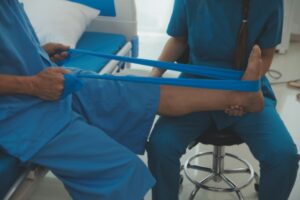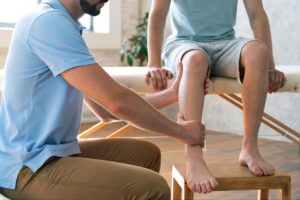Case Study: Anya, 15
Anya, a bright high-schooler from Delhi, visited VARDĀN with complaints of persistent neck stiffness, frequent headaches, and mid-back discomfort, unusual symptoms for someone so young.
She had no history of injury and was active in school sports. But a detailed clinical evaluation revealed the true cause: years of poor sitting posture during online classes, excessive gadget use, and a backpack that overloaded her spine.
Anya’s case isn’t unique. It’s becoming the norm.

The Posture Epidemic Among Teens
A 2023 study by the Indian Journal of Adolescent Health found that more than 68% of Indian school-going teenagers show signs of postural deviation, including rounded shoulders, forward head posture, and spinal misalignment.
Further, a global analysis from the World Health Organization linked prolonged sedentary behaviour in adolescents to a 30% increase in musculoskeletal complaints, especially neck, shoulder, and lower back pain.
In other words, poor posture is no longer just an “adult” concern. It’s becoming a silent structural crisis in teens and students.
Why Early Posture Matters More Than Ever
The teen years are a period of rapid musculoskeletal development. Bones are still growing, fascia is forming movement memory, and neural pathways for coordination are being hardwired.
When posture is compromised during this critical window, the consequences ripple into adulthood—leading to:
- Spinal deformities
- Chronic tightness and fatigue
- Reduced athletic performance
- Breathing pattern dysfunctions
- Early onset of degenerative issues
The Common Triggers of Postural Dysfunction in Students
- Digital Overload: Long hours on laptops and phones promote “text neck” and kyphotic (hunched) postures.
- Improper School Furniture: Non-ergonomic desks that fail to support the natural spinal curves.
- Heavy Backpacks: When backpacks exceed 10–15% of a child’s body weight, they distort pelvic alignment and shoulder positioning.
- Sports Without Recovery: Young athletes often train with intensity but little emphasis on joint health, mobility, or fascial balance.
- Lack of Movement Variety: Extended sitting inhibits core engagement and hip mobility, weakening the body’s postural support systems.
When Should Parents Act?
Here are some red flags to watch for in your teen or student:
- Digital Overload: Long hours on laptops and phones promote “text neck” and kyphotic (hunched) postures.
- Improper School Furniture: Non-ergonomic desks that fail to support the natural spinal curves.
- Heavy Backpacks: When backpacks exceed 10–15% of a child’s body weight, they distort pelvic alignment and shoulder positioning.
- Sports Without Recovery: Young athletes often train with intensity but little emphasis on joint health, mobility, or fascial balance.
- Lack of Movement Variety: Extended sitting inhibits core engagement and hip mobility, weakening the body’s postural support systems.

Functional Manual Therapy® (FMT™) at VARDĀN: Building Resilient Posture and Movement in Young Adults
FMT™ is not a generic exercise routine. It’s a clinically proven, hands-on intervention that addresses the structural and neuromuscular causes of poor posture.
At VARDĀN, our licensed clinicians work one-on-one with teens and students to:
- Assess the entire movement system—not just where the pain is, but why it’s happening
- Release fascial restrictions built from prolonged sitting or improper movement
- Correct joint alignment from the head and neck down to the pelvis and feet
- Retrain postural muscles to activate correctly during sitting, walking, and sports
- Equip students with posture habits that align with real-life demands—study, travel, sports, and digital use
Why Posture Correction Needs More Than a Brace or an App

Parents often try posture braces, mobile apps, or YouTube exercises in an attempt to “fix” their teen’s posture. But these approaches lack one essential ingredient: clinical precision.
Without a thorough understanding of joint alignment, fascial tension, and neuromuscular coordination, no external device can achieve true postural correction.
FMT™ corrects from the inside out—not with gimmicks, but with science-backed therapy and movement education.
The Long-Term Benefits of Early Postural Correction
- Improving their focus and breathing capacity
- Reducing the risk of sports injuries and future surgeries
- Supporting better neuromuscular coordination
- Building a body that ages actively and pain-free
Ready to Future-Proof Your Teen’s Movement?
Call us today at +91 011 43580720-22 / 9810306730
📅 Book your root-cause consultation at www.vardan.in
📍 Visit our advanced physiotherapy clinic in Delhi in Lajpat Nagar




